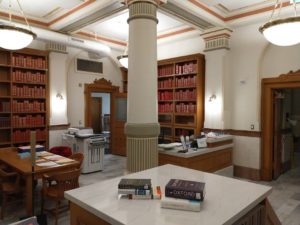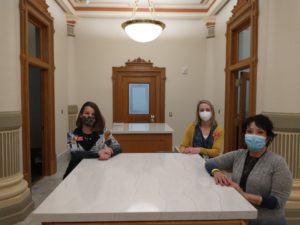by Duane Gall and Megan Waples
Editor’s note: This article was originally written by Kate Meyer and published December 7, 2017. The article has been edited and updated as appropriate.
Odds are, if you spend any time in the Capitol as a legislator or staff member, you’ll be the recipient of a “Colorado Open Records Act” (CORA) request at some point. In fact, given the recent uptick in CORA requests—and no sign that this trend is abating anytime soon—you may even have multiple requests with which to deal (if you haven’t already!).
This article addresses issues and answers questions that frequently arise for legislators and legislative staff in responding to a CORA request. Specifically, we’ll talk about deadlines associated with requests, tips for finding records, and other considerations you may find helpful. [Note: In addition to CORA, this article refers to the policies of the Colorado General Assembly regarding public records requests. The policies are included in the “Legislative Policies Related to Public Records and E Mail,” dated July 2019 (“the Policies”) and are available through the “Open Records Requests & Policy” link at the bottom of the Colorado General Assembly website.]

Deadlines
I’ve received a CORA request; what do I do and when do I need to do it? The first thing a legislator or legislative staff person should do is contact the Office of Legislative Legal Services, and he or she should do so as soon as possible. As you will see below, time matters in responding to CORA requests. The OLLS staff will work with you to prepare a response.
LegiSource previously covered the nuts and bolts of being “CORA’d.” Please refer to that article, and the Policies, for a broad overview of the process–and keep in mind that CORA imposes strict deadlines. Generally, upon receiving a CORA request, recipients have three business days to respond in some fashion, although production of all of the requested records may not actually be completed within that time.
This CORA request is dated more than three days ago, but I only just opened the email/got the letter/found out about it from OLLS. What is my deadline to respond? According to subsection II.C.5 of the Policies, the CORA clock starts ticking when the recipient actually receives the request or, in the case of a request to a legislator that is also sent to the Office of Legislative Legal Services (OLLS), the earlier of when the legislator actually receives the request or when the OLLS notifies the legislator of the request and confirms that the legislator is aware of it. So, how does this work in real life?
- Example 1: If a CORA request arrives on August 1st (i.e., during the interim) via United States mail to a legislator’s office at the Capitol, and the legislator doesn’t open it until he or she is in the office on September 1st, the period of time in which to respond commences on September 1st, and a response is due three business days later on September 4th.
- Example 2: The same CORA request from Example #1 is also sent to the OLLS, in accordance with the Policies. The OLLS receives its copy on August 1st and promptly leaves a message for the legislator to whom it is addressed. The legislator and the OLLS actually discuss the request on August 4th. In this case, August 4th is the day from which the response deadline is calculated, so the response will be due on August 7th.
Ack! I need some time to get to my records to determine whether I have any to produce. Despite the stringent deadlines that attach to any CORA request, there is some wiggle room (up to seven additional business days) for recipients when “extenuating circumstances” exist. Even so, the recipient must provide written notice to the requestor, within the initial 3-day window, that the recipient is invoking an extension due to extenuating circumstances.
Ok, but what constitutes “extenuating circumstances”? Subsection II.D.3 of the Policies states that extenuating circumstances exist when a request is submitted during the legislative interim and the recipient legislator’s office is closed. CORA itself provides that extenuating circumstances apply when an agency can’t fulfill a broadly stated request encompassing a large volume of records. In the case of the general assembly or its staff or service agencies, this specifically includes the period when the general assembly is in session (section 24-72-203 (3)(b)(II)(B), C.R.S.).
Of course, “extenuating circumstances” do not exist when the CORA request is merely inconvenient. Because someone may file a CORA request at any time and the turnaround period is so short, CORA requests can be very inopportune. Although “[r]esponding to applications for inspection of public records need not take priority over the previously scheduled work activities of the custodian or the custodian’s designee” (Policies, subsection II.D.2.a), CORA recipients must take their duties under the law seriously even when a request comes at a bad time.

Finding records
How should I assess whether I have responsive records? First, read the language of the request carefully. Many requests are limited to certain dates, names, terms, topics, and types of records. A legislator responding to a CORA request should keep in mind the request’s parameters. Start by using the request itself to identify appropriate search terms. Often, certain records are specified or terms are provided. If not, reassess: Is the request sufficiently specific to enable the legislator to comply? If so, proceed, making reasonably diligent and good faith efforts to devise search terms to unearth any responsive records. If not, the requestor will need to be contacted to clarify his or her submission. Please consider allowing OLLS to handle this on your behalf.
So, do I just need to check through my emails? No, not necessarily. CORA and the Policies broadly define “public records” to include many types of records. Only if the request is explicitly limited to emails should the legislator confine his or her review to emails. If the CORA request seeks records in broad-based categories such as “all correspondence/records/documents” or “any communications,” the type of records covered by those broad categories is not limited to emails but could be any type of correspondence—printed letters or memoranda, hand-written notes, screenshots of text messages or social-media posts, etc.
Reviewing and retrieving my records will take me a few hours because I potentially have quite a few records to produce. In that case, please STOP! If responding to a CORA request will require more than one hour, the requestor must pay a deposit based on the estimated time required (not counting the first hour) to retrieve any potentially relevant records. Therefore, if it appears that you will need more than one hour to respond to a request, please give OLLS an estimate of the time that it will take. (In the case of emails, you can estimate the number of emails that may be responsive to the request, because we apply a standard factor of 2.5 minutes per email to calculate the time required to process emails.) The OLLS will then multiply the estimated time by an hourly rate to calculate the estimated search-and-retrieval fee.
The requestor must pay a deposit, equal to the estimated search-and-retrieval fee, within 30 days. Only when this payment is received should you proceed with actually assembling the requested records. If payment is not received within the 30-day period, the CORA request is deemed closed and no further action is required.
The requestor must be notified of the requirement for payment of the deposit within three business days after receiving the request unless extenuating circumstances exist. (See item #3 in Deadlines, above.)
Because the fee deposit is based on an estimate, the actual number of records located and the corresponding time spent retrieving and reviewing those records in order to respond to the CORA request may vary from the estimate. If it falls below the estimate, the overage paid by the requestor is refunded to him or her. If it exceeds the estimate, the requestor must pay a supplemental fee to cover the amount of time the legislator estimates will be necessary to retrieve the remaining volume of records.
Do I have to produce my personal records that contain a term or otherwise appear to fall within the scope of the CORA request? Not necessarily. It’s the nature of the record, and not the platform on which it is created or stored, that is determinative. The mere fact that a document is created during one’s tenure as a legislator does not render it a public record. CORA defines “public records” as writings “made, maintained, or kept by the state, any agency, … or political subdivision of the state … for use in the exercise of functions required or authorized by law or administrative rule or involving the receipt or expenditure of public funds.” Further, the Colorado Supreme Court has observed that the definition of “public records” in CORA is intended to preserve a balance between private and public interests. Accordingly, the scope of CORA’s “public records” definition limits the type of documents covered by CORA to those that relate to the performance of public functions or the receipt and expenditure of public funds. The Supreme Court has stated that “CORA was not intended to cover information held by a government official in his private capacity.” https://www.courtlistener.com/opinion/2623451/wick-communic-co-v-montrose-county-board/
On the other hand, a public record is a public record regardless of the medium. So if a legislator uses a personal email account to conduct public business (e.g., relating to the performance of official functions), the records pertaining to that public business are still “public records” and must be disclosed if requested under CORA.
Is my constituent correspondence subject to disclosure under CORA? Potentially, yes. CORA’s definition of “public records” explicitly exempts a constituent communication that “clearly implies by its nature or content that the constituent expects that it is confidential or is communicated to request assistance or information relating to a personal or private matter that affects the constituent and that is not publicly known.” But any other constituent correspondence (e.g., an email urging that a legislator vote for or against a particular bill) is subject to disclosure. If a legislator has constituent correspondence that falls within the definition of “public records,” the OLLS will assist in redacting the constituent’s personal e-mail address and any extraneous matter such as forwarding headers, etc., before the document is released.
Any other lifelines I can use? In addition to the OLLS, legislators may want to use their own staff members (aides, interns) for assistance in responding to a CORA request. Aides and interns are often tech-savvy and are familiar with the types, locations, and amount of records in a legislator’s custody. And legislators may want to apprise their caucus’s leaders or staff about CORA requests so that they can track and assist with the responses if desired.
Other Considerations
 The requestor didn’t specify a reason for the request/I suspect the request is ill-intentioned. CORA does not require a requestor to explain why a request is submitted or for what purpose or in what manner any documents produced in response will be used. A record is either subject to inspection or not; the motivation for the request is irrelevant.
The requestor didn’t specify a reason for the request/I suspect the request is ill-intentioned. CORA does not require a requestor to explain why a request is submitted or for what purpose or in what manner any documents produced in response will be used. A record is either subject to inspection or not; the motivation for the request is irrelevant.
The request I’ve received is very, very broad; doesn’t the request need to be limited in some way? There is no requirement that a request contain any parameters; in fact, requests are often couched in expansive terms. For example, requestors can state that they are seeking “all records” that include a certain term (e.g., “energy” or “House Bill xxxx” or “the Jane Doe Lobbying Firm”), and they do not otherwise narrow the scope of the request. This approach can be deliberate (if a requestor isn’t certain what records may exist and thus wants to cast a wide net) or inadvertent (if a requestor doesn’t anticipate the large volume of records that a custodian may have in his or her possession that may contain the sought-after term). So long as the request is “sufficiently specific to enable the custodian to locate the information requested with reasonable effort” (Policies, subsection II.C.1.), that’s all that matters.
Once I’ve been CORA’d, may I continue to discard records in accordance with my usual records retention process? No, at least not with respect to any records that may be included within the scope of the CORA request. You should treat a CORA request the same way you would treat a litigation hold, under which a person is obligated to preserve records for a certain amount of time in anticipation of future potential use at trial. Once the CORA request is completely concluded, you may proceed with document disposal pursuant to your normal retention and disposal policy. (For more information on developing such policies, please refer to Subsection IV of the Policies and consult with the OLLS.)
Whew! Responding to that CORA request seemingly took forever; how can I reduce the amount of time the next one takes? You can mitigate the time spent responding to requests by creating (and abiding by) a written records retention policy that establishes how long you keep various types of records, the frequency with which you dispose of records, etc. The fewer records in existence, the lower the volume of records that you may have to review and therefore potentially less time you will spend searching for, retrieving, and reviewing them. Alternatively, you may feel it necessary, in order to adequately complete your legislative duties, to maintain records for significant lengths of time. The Policies contain a number of guidelines and recommendations regarding records categorization, retention, and deletion; you may also consult with the OLLS. If you decide to establish a written records retention policy that could affect the documents produced in response to a specific CORA request, the policy must be in place before the request was received.






